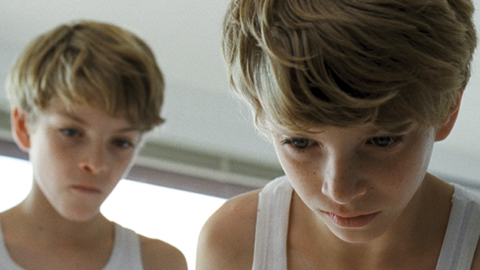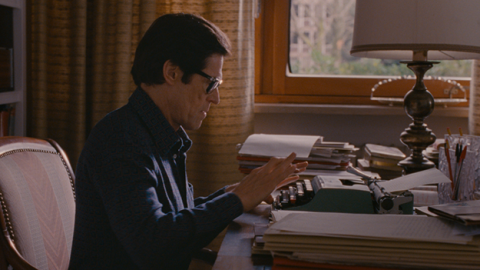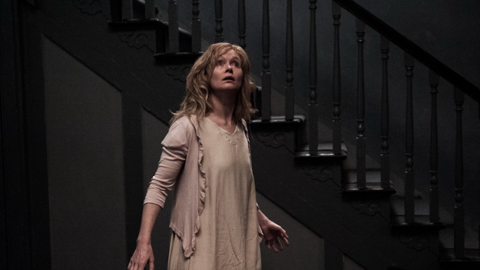Film of the Week: Goodnight Mommy
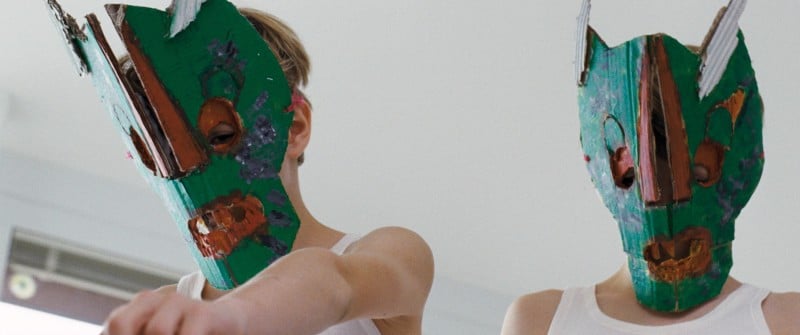
Now here’s an ominous juxtaposition. Austrian chiller Goodnight Mommy begins with a brightly colored archive clip—I’m guessing from the Forties—of a happy group of children, all dressed in Von Trapp Family shorts and frocks, standing around their rosy-cheeked mother as they sing a German lullaby in heart-tugging harmony. Cut to a caption, white on black: “Ulrich Seidl Film Produktion.” If you know that director’s own films, you’ll suspect that we’re in for a sobering deconstruction of Austrian social and familial values, a merciless laying bare of the dread behind the dirndls. Actually, Goodnight Mommy is even grimmer than that implies.
While Seidl produced Goodnight Mommy, it doesn’t remotely feel like any of his own work. It’s written and directed by the director’s partner and regular co-writer Veronika Franz and his nephew Severin Fiala. The fact that it’s a family affair arguably makes Goodnight Mommy a touch more creepy. I wish I could say all the more subtly creepy—but as long as it’s holding back from the excess that eventually overpowers it, this is an intensely powerful film.
Some reviews have described Goodnight Mommy as “art horror”—which I suppose it is, in the sense that this is a highly formal, intensely poised, somewhat detached piece which only comes to resemble any recognizable commercial horror film in the last half hour, when things get a little conventionally grisly. Notwithstanding this descent into Grand Guignol—which to me felt less confrontational than just over-stressed—Goodnight Mommy is a genuinely strange and unsettling film. It’s the latest addition to the canon of fictions (running from The Turn of the Screw, through The Omen, to the recent The Babadook) proposing that children’s psyches contain secrets as horrifying as anything in a homicidal adult’s barred-and-bolted attic.
I wonder whether there’s yet such a thing as a “twins lobby” that has protested against cinema’s depiction of identical siblings as malign and sinister; if so, this is the film to get them up in arms. The story is set in the Austrian countryside, where two young boys, identical, blond, and with a candid air of innocence, are playing in a cornfield. One boy runs through long avenues of foliage—seen in POV—before the other, wearing a home-made devil mask, jumps out at him. On their way home, they run over a strange, spongy soil that has the elasticity of a trampoline surface. Are we really in Austria? Even on Earth? You decide—things will get stranger.
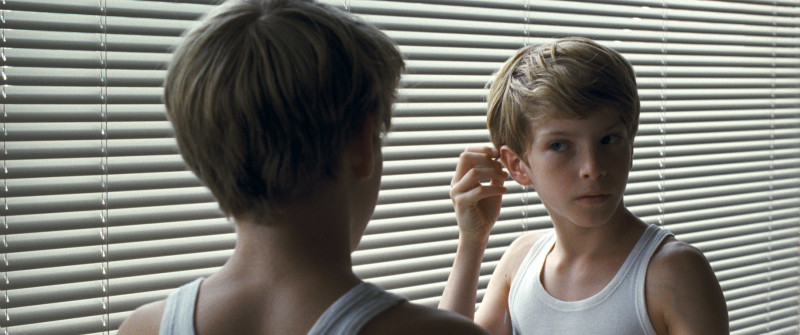
The brothers live in a sheened steel-and-glass modernist house by a lake, seemingly left to their own devices—but soon, here comes Mama (Susanne Wuest). Apparently a famous TV presenter, she has been away undergoing cosmetic surgery: the woman we see greeting the boys is a skinny, skeletal woman, her face wrapped in bandages (does the mummy/mommy pun work in German?), making it look like a hideous rictus. She greets her boys in an oddly cold, peremptory way, but they don’t seem frightened of her. It’s only later, as she starts laying down the law with a distinct edge of brutality that the boys start to feel that she’s not the mother they were waiting for to come home—literally, that she’s not their mother. A war of attrition starts, at first subtly, then later… well, suffice to say that about an hour in comes the point when Goodnight Mommy might start to tickle Eli Roth.
Before that, however, it is an intensely strange and powerful thing—executed with a sly, rather chilly control, and with a distinct touch of the surreal. Apart from that spongy soil, other elements evoke a faintly unreal world: the tank of huge cockroaches that the boys collect as pets (echoed in their curious insect-pattern wallpaper), the underground ossuary, the empty village whose most conspicuous inhabitant appears to be a ranting accordionist. Many of the most unsettling touches are gaps in the narrative, or little unexplained imbalances. Where, for example, is their father? Who has been tending the boys while Mother’s away? And why does one twin keep calling out his brother’s name, Lukas, while the other’s, Elias, is not heard till 50 minutes in?
By the way, I was convinced that the name Lukas was an allusion to the unworldly twins Lucas and Claus in the trilogy of novels beginning with The Notebook, by Hungarian writer Agota Kristof; it would have fitted perfectly, except that it turns out that the film’s brothers are in real life named Lukas and Elias Schwarz. That’s one of the things that worries me here; given the story’s nightmarish intensity, it’s that bit more discomforting that the boys are given their real names on screen. And it surely takes directors with nerves of steel, or blood of ice, to so confidently place child actors in scenarios that you imagine could traumatize them for life—quite apart from its probable effect on parents of sober-mannered blond children.
Production designers Johannes Salat and Hubert Klausner have created a distinctly atmospheric (or given its antiseptic ambience, perhaps anti-atmospheric) refrigerator of a living environment for this supremely dysfunctional family—perhaps just the sort of country retreat favored by Austrian TV stars, but a manifest illustration of the dictum “In Every Dream Home a Heartache.” The film is shot on 35mm by Martin Gschlacht—a dependably brilliant cinematographer whose credits include work with Michael Glawogger, Jessica Hausner, Shirin Neshat, and Seidl himself, in the documentary In the Basement. Outdoors, the photography is rich, tactile, suggesting a kind of chaos in the well-tended Austrian countryside; indoors, it’s cool, formal, rectilinear, highlighting symmetries and their disruption.
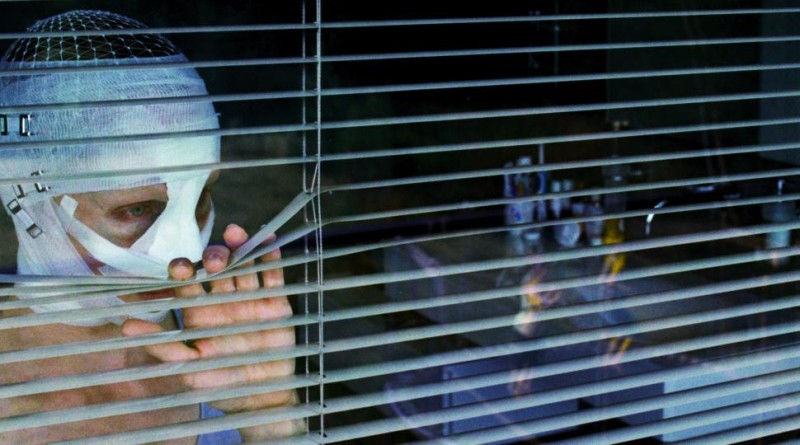
The buildup to the nastier stuff is crisp and sometimes bleakly jokey—a sudden flash of a bloodshot eye, and of course those cockroaches get their moment or two. But the most genuinely nightmarish moment is a vision in a forest, involving some of that high-speed head-shaking that you inevitably associate with Adrian Lyne’s Jacob’s Ladder, and that hasn’t lost its freaky power here. And the relaxed pacing hits a nicely merciless moment of comic delay when two clueless Red Cross charity collectors blunder in – and then just sit around, taking their time.
It’s tempting, of course, to regard Goodnight Mommy as a quintessentially Austrian horror story; after all, Seidl’s own films, whatever else they may be about, are always also about that country’s dysfunctions. There are many specific national references here, from that singing family onward. They include ominous descents into dark basements, which, as we know, have played a certain baleful role in recent Austrian history (see Markus Schleinzer’s Michael). You might see Goodnight Mommy as an illustration of the price to be paid for bad parenting—and, given the blonde angelism of the sons here, you might then want to theorize on what bad parenting has meant for certain Austrian and German generations (that, of course, being a primary text of Michael Haneke’s The White Ribbon).
But national allegory seems the least interesting aspect of a story that works by sly, almost mathematical suggestion. Early on, the boys and their newly returned mother play a game in which each has to guess their own identity from labels stuck on their foreheads: the trouble begins when she fails to identify herself as “MAMA.” At such moments, the fact that we’re watching a horror story seems almost to matter less than the abstract themes that run throughout, mostly expressed in sharp visual terms: duality, resemblance and difference, recognition and non-recognition. It’s also there in the German title, Ich seh, Ich seh, literally “I see, I see…” (or “I Spy”), but printed in the titles with a vertical line down the middle.
As a fable of parental paranoia, Goodnight Mommy would make an obvious double bill with The Babadook, about a mother trying to protect her son from a ghoul, which may be a projection of his anxieties, but in the process herself becoming the rampaging monster in the home. However, that film, with its wit and suburban perversity, was finally very cathartic. There’s little catharsis to be hoped for in Goodnight Mommy, which overall feels calculating to the point of iciness, and cruel to the point of heartlessness. But once you’ve got beyond its harsher excesses, the film does flip over neatly with a concise and elegant twist—I hesitate to say it, but a touch of Goodnight Shyamalan.
Goodnight Mommy opens September 11, with the directors in person on September 8 for a Q&A at the Film Society of Lincoln Center.



